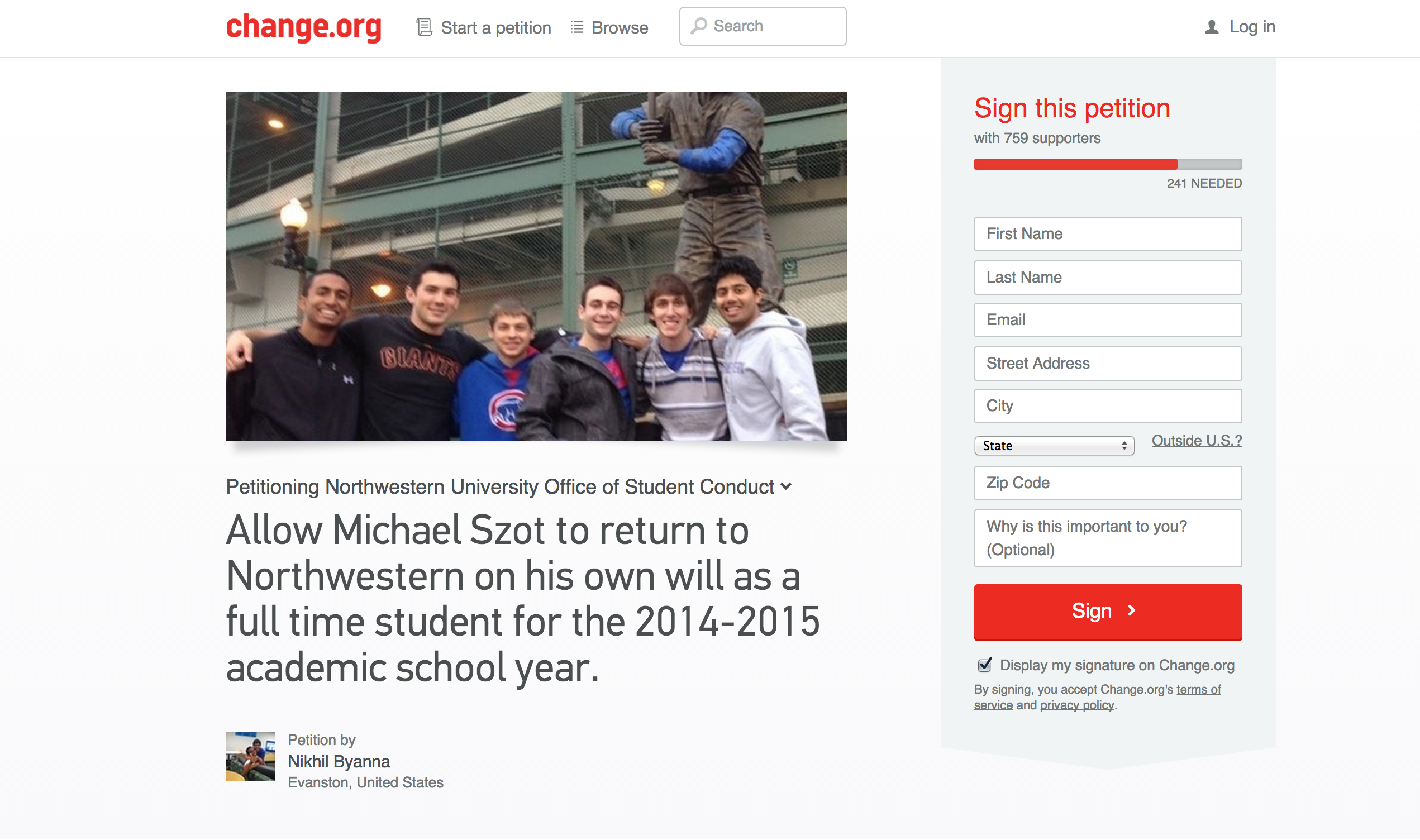
Nikhil Byanna was one of the first to hear the news: that two of his friends were involved in a drunk driving accident; that one of them, Michael Szot, faced nine counts of aggravated driving following the deaths of McCormick senior Mihirtej Boddupalli and Indiana University senior Sajaad Syed. When Byanna found out the University was considering suspending Szot, he petitioned the Office of Student Conduct to allow Szot to return for the academic year.
Byanna refrained from mentioning himself in the Change.org petition, opting instead for first person plural: “We believe that Michael Szot, a rising senior at Northwestern University, should be allowed to return to Northwestern on his own will for the 2014-2015 academic school year,” the petition began. "We want to support Mike … We urge Northwestern to act in a manner consistent with what Mihir would have wanted: for Mike to be given the chance to complete his senior year and earn his degree.” Byanna has also refrained from commenting to the media. Save for a “Petition by Nikhil Byanna” caption next to a thumbnail of him and the late Boddupalli on the petition page, his mourning has been private, not public.
But in creating the petition, Byanna cast a pointed question into the Internet public: Should Szot be allowed to return for his senior year while his charges remain pending, or can the University keep him from attending class?
Szot has been released from DuPage County Jail on a $250,000 bond whose conditions prohibit him from driving a motor vehicle or consuming alcohol and require him to wear a blood-alcohol monitoring device. Motions to place Szot in home confinement with GPS tracking were denied by the court at his bond hearing, so there are currently no legal measures barring him from returning to Evanston. However, as a private institution, Northwestern maintains its own code of conduct for disciplinary actions. Citing the Family Educational Rights and Privacy Act, Director of Media Relations Bob Rowley declined to comment on what these actions are in Szot’s case other than to confirm that Szot is not currently enrolled at Northwestern.
Ultimately, Szot’s enrollment decision is Northwestern’s to make, according to Northwestern Law School adjunct professor and retired Kirkland & Ellis LLP partner Steven Harper.
“University action that adversely affects a student triggers an interplay between two forces: a student's due process rights and the university's power and discretion to make decisions about how to run the institution,” Harper said. "I don't think a petition has any legal significance in resolving that tension.”
Dean of Students Todd Adams expressed a similar point.
“The individual or group that can petition to appeal disciplinary sanctions is the individual or group that receives the sanctions,” Adams said. “Petitions by other parties are not subject to consideration.”
Northwestern students are still "subject to the University’s disciplinary policies and procedures for incidents that occur off-campus,” according to the Office of Student Conduct’s website. Driving under the influence of alcohol and illegal drugs is listed under “Prohibited and Restricted Conduct” in the Student Handbook, whose jurisdiction is wherever "the conduct has a real and substantial connection to the legitimate interests of the University or members of the University community.”
For friends of Szot and Boddupalli, however, the choice to advocate for Szot’s return is less about conduct policies and more about personal support.
"Nikhil was one of Mihir's best friends and one of Szot's closest too, so he knows best for them and I always trust his judgement,” said McCormick junior David Olodort, a close friend and fraternity brother of Szot and Boddupalli. "We have been trying to support [Szot] as best as possible through all of this, but there sadly was not much we could do until this petition, which is at least a start.”